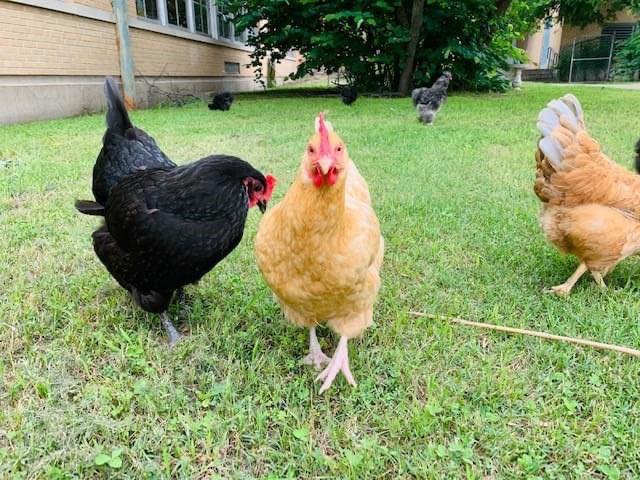What is your professional background? I started teaching with Dallas ISD in 1999 and have taught elementary and middle school and worked as an instructional coach. I disliked the teacher focused, teacher controlled aspect of the traditional classroom, and, in 2013, jumped at the chance to work as an upper elementary teacher in one our district’s Montessori schools. I did the coursework for Lower and Upper Elementary, and am AMS certified for Upper Elementary.
Please describe the chicken coop project. My school had chickens when I first got here, but it was set up so each class took care of the chickens for one week, and it didn’t really work out so well, as no one was really in charge. Those chickens were later adopted by a family, and the coop was empty for a few years. I’ve always remembered, when I was 4 or 5, going to a neighbor’s house who had chickens. Her mom would send us out with a little basket to collect the eggs. It seemed magical. I put my egg down on the ground too hard when I was going out the coop door, and it broke. I was upset but it was a great Montessori lesson – to be careful and gentle with nature. It was a big lesson at a young age.
What led you to begin this project? In 2019, I found out about a program the school district offered– we could get the supplies to hatch eggs in our classrooms. The science teacher and I participated, and ultimately, we ended up with five chickens.
In 2020, we returned to school with Covid restrictions, but without the high pressure to ensure students performed well on state tests as a public Montessori school. Instead of prioritizing academic learning, I prioritized joy. In the midst of a pandemic, where people were literally protesting mask mandates outside of my school, I wanted children to feel safe. I wanted a predictable environment where children could be nurturers.
That year, we really leaned into chicken care and garden care and outdoor learning. Each day of the week a different group gardened, cared for the chickens, or did schoolwork on the picnic tables by the chickens. It was a structured routine that had opportunities for children to be responsible and trustworthy. While kids across the world were checking out of school, staying home and feeling depressed, my students were making their parents get them to school early so that they wouldn’t miss their chance to let the chickens out of the coop.
The school science teacher took students from throughout the school out to work with the chickens. Upper El students paired with Lower El, and PRK-K classrooms to give chicken coop tours. Students maintained a Chicken Journal with factual entries about things like hawk attacks and chickens hatching, and creative entries including poems, stories with chicken characters, and comic strips. Children read articles about chicken care, salmonella, and how eggs hatch.
At the end of 2021, I administered a Chicken Impact Survey to the upper elementary students. Because of chicken interactions, 90.5% felt happier and 67% liked school more. 92.9 % looked forward going to school if they knew they would work with chickens. The chickens are still providing joy at school. You can feel pretty stressed, and if someone puts a warm, soft chicken in your arms – it’s magical. You automatically relax.
What have you learned along the way?
Importance of parent helpers – we have a parent who checks on the chickens over breaks and last year I had a parent take small groups of children out for chicken care (food, coop cleaning, fresh water).
Bad things can happen to chickens. We’ve lost chickens to sickness, hawk attacks (ours free range during the day) and once our own carelessness – we left a chicken out overnight and predator got it.
Be vigilant about securing your coop and your chicken food. A little bit of water can end up ruing $50 worth of food. Unsecured food brings rats, and they will tunnel in under the coop to get the food.
You can plan as much as you want, but things are always going to come up to wreck your plan. For example, one attempt at incubating eggs was foiled when a tornado hit the neighborhood our school is in – there was not power and the police would not let anyone in the streets around out school. You just have to roll with it and learn from it.
Where do you hope that the project goes? I hope the project continues as it is now. With a flock of 12 hens and two roosters (most are Silkie chickens), the project is at a manageable level. This year, I’m training teams of students to work with younger students on writing skills – I have lessons on technical writing (drawing and labeling a diagram of the coop and writing about its features) and another on descriptive writing using sensory details and figurative language for my students to teach Lower El.
What else would you like to add? Our #1 rooster is named Bob. His job is to protect the hens and he chases them under bushes when he sees a hawk or an airplane. Last week, a security specialist came to make sure that our doors were locked, but could not check the door by the coop – because Bob chased him away. The kids love Bob and pick him up and carry him around. Interested teachers and parents can join Leslie’s Schoolyard Chickens Facebook group here.

Leave a Reply